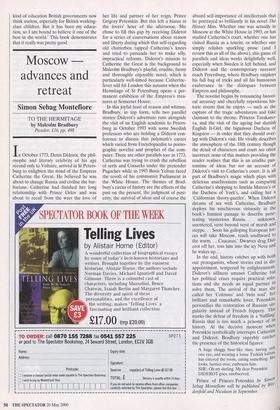Moscow advances and retreat
Simon Sebag Montefiore
TO THE HERMITAGE by Malcolm Bradbury Picador, £16, pp. 498 In October 1773, Denis Diderot, the phil- osophe and literary celebrity of his age second only to Voltaire, arrived in St Peters- burg to enlighten the mind of the Empress Catherine the Great. He believed he was about to change Russia and civilise the bar- barians. Catherine had finished her long relationship with Prince Orlov and was about to recall from the wars the love of her life and partner of her reign, Prince Grigory Potemkin. But this left a hiatus in the lovers' hour of the afternoon. She chose to fill this gap by receiving Diderot for a series of conversations about reason and liberty during which that self-regarding old chatterbox tapped Catherine's knees and tried to persuade her to make silly, impractical reforms. Diderot's mission to Catherine the Great is the background to Malcolm Bradbury's playful, erudite, funny and thoroughly enjoyable novel, which is particularly well-timed because Catherine- fever will hit London this autumn when the Hermitage of St Petersburg opens a per- manent exhibition of the Empress's trea- sures at Somerset House.
In this joyful feast of reason and whimsy, Bradbury, in top form, tells two parallel stories: Diderot's adventure runs alongside the visit of an English academic to Peters- burg in October 1993 with some Swedish professors who are holding a Diderot con- ference to discuss that polymath's career which varied from Encyclopaedist to porno- graphic novelist and prophet of the com- puter. There are other parallels too: in 1773, Catherine was trying to crush the rebellion of serfs and Cossacks under the pretender Pugachev while in 1993 Boris Yeltsin faced the revolt of his communist Parliament in the White House. The themes of Brad- bury's circus of history are the effects of the past on the present, the judgment of post- erity, the survival of ideas and of course the absurd self-importance of intellectuals that he portrayed so brilliantly in his novel The History Man. Whether one was actually in Moscow at the White House in 1993, or has studied Catherine's court, whether one has visited Russia as a tourist, or whether one simply relishes sparkling prose (and I review this as all of the above), this game of parallels and ideas works delightfully well, especially when Sweden is left behind, and Diderot and the contemporary narrator reach Petersburg, where Bradbury employs his full bag of tricks and all his humorous exuberance in the dialogues between Empress and philosophe.
The novelist begins by renouncing histori- cal accuracy and cheerfully repositions his- toric events that he enjoys — such as the capture of the tragic adventuress and fake claimant to the throne, Princess Tarakano- va, and the visit of the ageing but sluttish English It-Girl, the bigamous Duchess of Kingston — in order that they should over- lap with Diderot's visit. He vividly describes the atmosphere of the 18th century though the detail of characters and court are often incorrect: none of this matters providing the reader realises that this is an erudite pan- tomime of ideas but not an account of Diderot's visit to Catherine's court. It is all part of Bradbury's magic which plays with delicious anachronisms such as comparing Catherine's shopping to Imelda Marcos's or the Duchess of York's, and calling her a 'Californian theory-guzzler'. When Diderot dreams of sex with Catherine, Bradbury deploys his mischievous virtuosity in the book's funniest passage to describe pene- trating 'mysterious Russia. . . unknown, unentered, verst beyond verst of marsh and steppe. . . Soon his galloping European for- ces will take Moscow, reach southward to the warm. . . Caucasus.' Dwarves drag Did- erot off her, toss him into the icy Neva and he wakes up... In the end, history catches up with both our protaganists, whose stories end in dis-
appointment, tempered by enlightenment.
Diderot's silliness amuses Catherine but her political crises require practical solu-
tions and she needs an equal partner to solve them, The arrival of the man she called her 'Colossus' and 'twin soul', her
brilliant and remarkable lover, Potemkin, personifies the restoration of Russian sin- gularity instead of French frippery. This marks the defeat of freedom in a 'baffling Russia that is too much a prisoner of its history. At the decisive moment when Potemkin symbolically interrupts Catherine and Diderot, Bradbury superbly catches the presence of the historical figures: A huge shaggy bear-like man, having onlY one eye, and wearing a loose Turkish kaftan, has entered the room, eating something. She looks, hurries over, embraces him.
SHE: Oh my darling. My dear Potemkin DIDEROT goes, unobserved.
Prince of Princes: Potemkin by Simon Sebag Sebag Montefiore will be published by Wel- denfeld and Nicolson in September.









































































 Previous page
Previous page